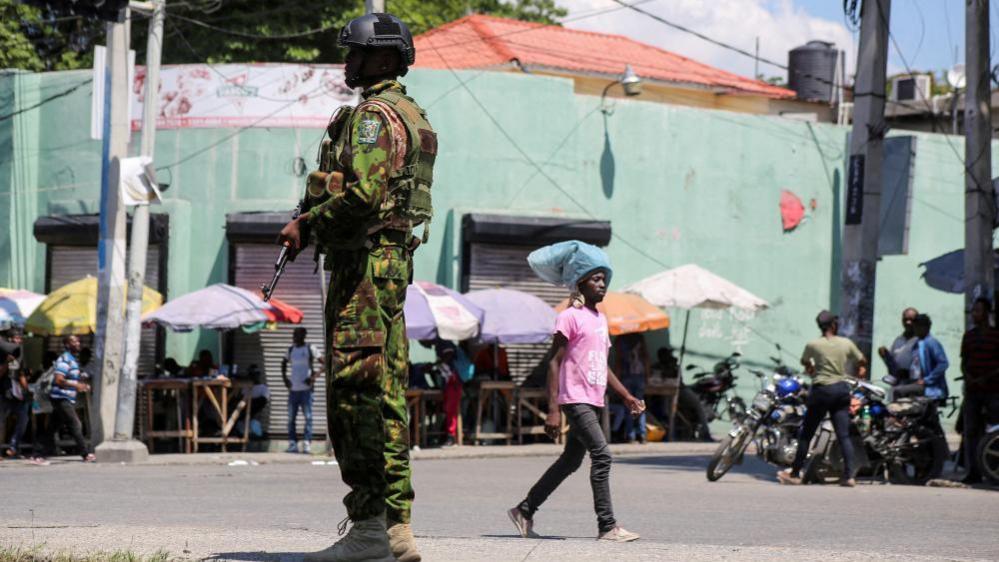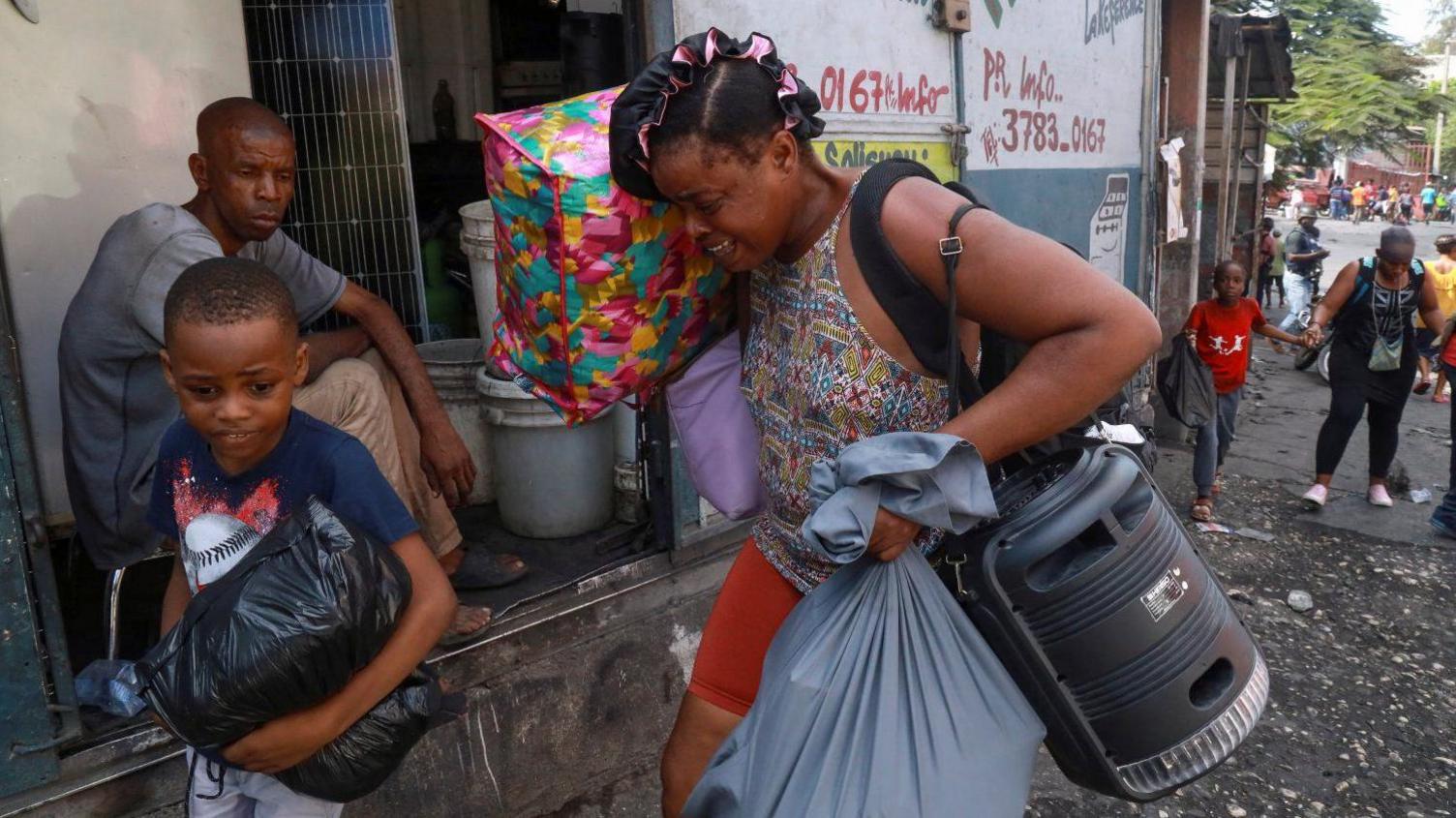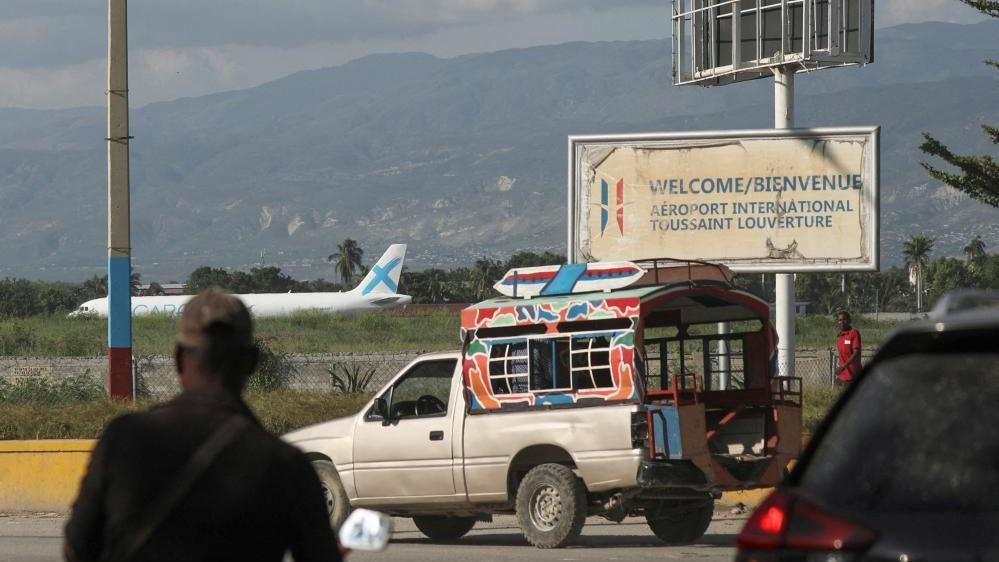Haiti gang kills 110 people accused of witchcraft

Haiti has been gripped by bloody gang violence in recent years
- Published
At least 110 mostly elderly people have been brutally murdered by gang members in the Haitian capital, Port-au-Prince, according to a human rights group.
The National Human Rights Defence Network (RNDDH) said a local gang leader had targeted them after his son fell ill and subsequently died.
The gang leader reportedly consulted a voodoo priest who blamed elderly locals practising "witchcraft" for the boy's mystery illness.
The United Nations said the number of people killed in Haiti so far this year in spiralling gang violence had reached "a staggering 5,000".
Warning: This story contains details some readers may find upsetting
While details from the massacre are still emerging, the UN's human rights chief Volker Türk on Monday put the number of people killed over the weekend "in violence orchestrated by the leader of a powerful gang" at 184.
The killings happened in the Cité Soleil neighbourhood of the capital.
According to reports, gang members seized scores of residents aged over 60 from their homes in the Wharf Jérémie area, rounded them up and then shot or stabbed them to death with knives and machetes.
Residents reported seeing mutilated bodies being burned in the streets.
RNDDH estimated 60 were killed on Friday while another 50 were rounded up and murdered on Saturday, after the gang leader's son had died of his illness.
While RNDDH said that all the victims were over 60, another rights group said some younger people who had tried to protect the elderly had also been killed.
Local media said that elderly people believed to be practitioners of voodoo had been singled out because the gang leader had been told his son's illness had been caused by them.
Rights groups said the man who had ordered the killings was Monel Felix, also known as Mikano.
Mikano is known to control Wharf Jérémie, a strategic area in the port of the capital.
According to Romain Le Cour Grandmaison, a Haiti expert at the Global Initiative against Transnational Crime (GI-TOC), the area is small but hard for the security forces to penetrate.
Local media said that residents had been prevented from leaving Wharf Jérémie by Mikano's gang, so news of the deadly killings was slow to spread.
The group forms part of the Viv Ansanm gang alliance, which controls much of the Haitian capital.
Haiti has been engulfed in a wave of gang violence since the assassination in 2021 of the then-president, Jovenel Moïse.
Data gathered by GI-TOC, external shows there was a decline in the murder rate between May and September of this year, after rival gangs had reached an uneasy truce.
But attempts by the gangs to expand their territory beyond their strongholds in the capital have led to particularly bloody incidents in the past two months, with ordinary residents rather than rival gang members being increasingly targeted.
On 3 October, 115 locals were killed in the small town of Pont-Sondé in the Artibonite department.
That massacre was reportedly carried out by the Gran Grif gang in retaliation for some residents joining a vigilante group to resist attempts by Gran Grif to extort locals.
If confirmed, the death toll given by the UN for this weekend's killings in Cité Soleil, would make it the deadliest incident so far this year.
With gangs in control of an estimated 85% of Port-au-Prince and increasingly large swathes of the countryside, hundreds of thousands of Haitians have been forced to flee their homes.
According to the International Organization for Migration, more than 700,000 people - half of them children - are internally displaced across the country.
Gang members often use sexual abuse, including gang rape, to sow terror among the local population.
In a report published two weeks ago, external, Human Rights Watch researcher Nathalye Cotrino wrote that "the rule of law in Haiti is so broken that members of criminal groups rape girls or women without fearing any consequences".
Attempts by the Kenyan-led Multinational Security Support Mission to quell the violence have so far failed.
The international police force arrived in Haiti in June to bolster the Haitian National Police but is underfunded and lacks the necessary equipment to take on the heavily armed gangs.
Meanwhile, the Transitional Presidential Council (TPC) - the body created to organise elections and re-establish democratic order - appears to be in turmoil.
The TPC replaced the interim prime minister last month and seems to have made little progress towards organising elections.
"They reign over a mountain of ashes," GI-TOC's Romain Le Cour Grandmaison writes of the council in his report.
Related topics
- Published20 November 2024

- Published13 November 2024
